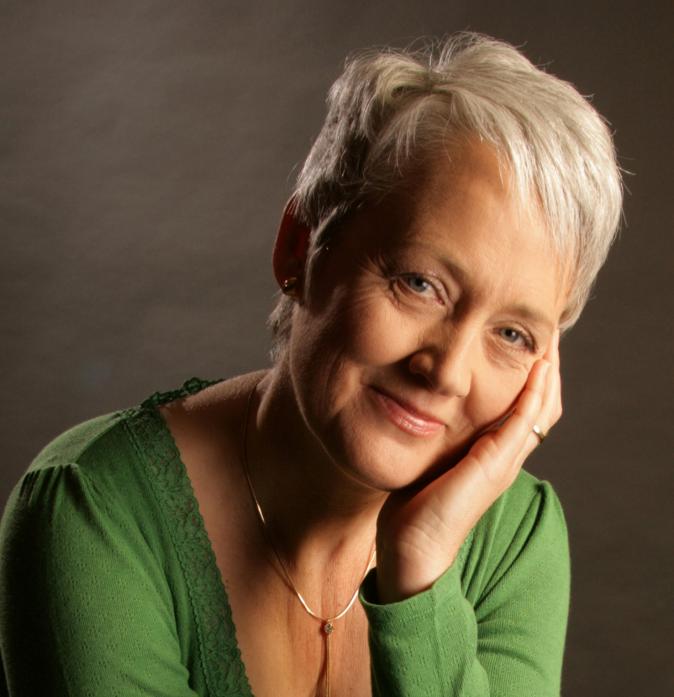
Penny Randall-Davis studied at the Guildhall School of Music and in Munich before her first solo engagements as the Queen of the Night with Scottish Opera, Welsh National Opera and English national Opera. Her career as a soprano has taken her all over the world and she has appeared in recital and oratorio throughout Britain, Europe and Asia. A committed teacher and accredited voicework facilitator, Penny has teaching practices in Teesdale and London, where she works with clients of all ages and abilities.
When did you first realise you had such a powerful voice?
My very strict convent school – which didn’t believe in music as an important academic subject – was taken by storm in my sixth form, when a drama teacher decided to put on productions by Gilbert and Sullivan. I remember the visceral moment when I realised I could really sing and interpret the music, albeit in a very bad kimono with a strange pseudo- Japanese wig.
Was there a specific moment when you “got serious” about singing – or did you have a plan from a young age to make the most of your talent?
From that moment on, really. I come from a working class family where there was definitely no money for music lessons, though I dearly wanted them. I had dreamt of becoming a violinist and loved classical music – introduced to me by my dad from an early age. I realised that, if you had a voice, singing was a path you could pursue slightly later. I had a few lessons while studying English at Durham University. After graduating I was fortunate to get into the Guildhall School of Music, even though they told me to go away for a year first and have some decent singing lessons.
Do you treat your voice like other musicians would treat their instruments?
Absolutely. Singers in some ways have a tough job, as we have to keep our physical self – our instrument – in good shape in order to deliver in all sorts of varying circumstances.
Much of my work now involves giving masterclasses, and my teaching practices here and in London, but I still warm up, and have singing lessons myself.
For performance that preparation intensifies, combined with resting the voice so that it can be really fresh.
Lots of singers schedule in a brief power-nap on the day of a show, if they can.
Oh, and no chocolate till afterwards!
Is it difficult to sing in a foreign language?
Counting on my fingers, I realise that to date I have sung in public in nine different languages. It’s always interesting, as singing in a language will have slightly different rules from conversing in it. Preparing pieces in Russian and Czech takes extra preparation time with a specialist coach, as I don’t speak either language. There have been brief, slightly mad forays into Polish and Azeri (Iranian).
As your career has progressed, has your voiced changed – and if so how?
I find it really fascinating to see how voices – mine included – are affected and enriched by every physical, psychological and emotional development in one’s life.
As we get older our voices generally broaden and deepen.
Having begun my professional life with a very high dramatic voice, I am now really enjoying singing larger, more sweeping repertoire – though still with lots of top notes!
What’s so good about opera?
I have performed in so many places – on soaking wet stages outside, in rattling marquees, in Sydney Opera House, La Fenice, in wonderful crazy Venice, and in downtown Toronto. I have also sung bits of opera to lovely schoolchildren in St John’s Chapel. That moment when a live voice (and often beautifully played live instruments ) creates an unforgettable atmosphere which the listener/watcher can live in, as the story of the drama is told with the combined instincts and committed energy of all the performers – that is special.
Equally special is feeling the response of the audience. One of my best compliments was from a lovely lad of eight who was blown away, sought me out and said: “Your voice makes my tummy feel so warm.”
And what’s the best thing about being an opera singer?
Probably the mad, diverse life which we get to lead. At the highest levels it’s intensely pressurised, but one gets to have so many brilliant experiences, whether it’s helping young professionals discover and hone their talent, teaching youngsters, or performing under a lot of scrutiny in grandiose settings.
One amazing moment was the rapt, silent audience sitting patiently on the concrete floor of the Piazza del Popolo, in Rome, as I delivered an aria from a 50ft tower. But probably the best thing of all is the quest to express that music as well and as truthfully as I possibly can.
What’s your favourite part to sing – and why?
Obviously the Queen of the Night, which was my thing. It was also a revelation to do many performances of both Violetta (La Traviata) and Gilda ( Rigoletto). Once you launch into a Verdi role you just have to give yourself up to the fantastic vocal and emotional journey which it involves.
And what sort of music do you like to listen to?
I love all sorts of music. I probably couldn’t live without hearing and singing Handel’s music as often as I do. It is the stuff of life, but I do have a sneaky passion for Marvin Gaye, Aretha Franklin and Ella Fitzgerald not to mention Bach and William Byrd.
The effect on the arts sector as a whole since lockdown has been catastrophic. Have you been affected?
All my work involves singing and live contact with others which were both put on hold for many months. Like so many freelancers I have been offering sessions on Zoom and Microsoft Teams and developing ways of being imaginative with online platforms. As it seems we may have to live with this situation for some time, right now I’m actively researching protective partition screening to divide my large studio space at home and make it Covid-safe, so that my teaching practice can resume. But it is a huge financial outlay.
How optimistic are you that you will be performing again in front of an audience any time soon?
I think none of us know how things will progress in the next year or so – we just have to try to keep going and be as inventive as we can. What I actually miss most at the moment is the stimulus of working with students directly; being able to help, and to offer my skills. It’s a worthwhile thing, and life is poorer without it.
What’s next on the agenda for you?
As ever, a mixture of things. I am vocal tutor with Barefoot Opera, which offers year-round training courses for classical singers, and so will be running online courses to replace our usual work. I am a part-time peripatetic teacher at Barney School and look forward to seeing my students there very soon. And I’m also really enjoying delivering Doorstep Singing, a project funded by ACE through Northern Heartlands.
I have been driving around Teesdale and Weardale giving free 35 minute sessions of singing for wellbeing, or simply serenading people . It’s been so rewarding – I have been having a brilliant time with this, and there are still some sessions available.





